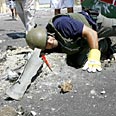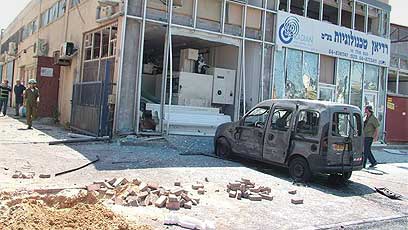
Katyusha in Haifa
Photo: Doron Golan

Attack in Nahariya
Photo: Reuters
The good thing about being a reserve spokesperson for the Israel Defense Forces sent to the north of Israel is that you don’t have the time or the opportunity to watch the news. After days of seeing northern Israeli communities come under Hizbullah missile attack on TV, this is a relief. Of course, the bad thing is that you come under Hizbullah missile attack.
The lobby of the hotel in Haifa last Friday morning looked like hotel lobbies do on these occasions: Anchor people from the major networks scrabbling for a new angle for their piece at the top of the hour; Journalists putting in requests to the army to be embedded with the Israeli forces operating in Lebanon; and everyone trying to pronounce the name of Brigadier-General Ido Nechushtan, who has just finished a briefing. We do that on purpose.
Friday afternoon and sirens go off, followed almost immediately by four explosions. The hotel workers run for the shelters, journalists and others run to the promenade outside the hotel that overlooks Haifa.

Katyusha in Haifa (Photo: Ahiya Raved)
The last explosion is deafening and clearly very close. Smoke rises from the center of the city. We jump into cars and rush to the spot. The rocket has plowed into the roof of a post office and exploded. Several injuries from the blast, no deaths.
This is Friday afternoon and public services are closed in Israel. One hour previously, and the post office would have been filled with the Jews and Arabs who make up the residents of this part of the city.
Deserted coast
Being interviewed on a European radio station, the interviewer snarls at me when I mention that Haifa has a mixed Jewish/Arab population and that as we speak, many of them were sitting in bomb shelters together, hiding from Nasrallah’s rockets.
I was surprised this information could be so irritating. I didn’t dare tell him about the guy who came up to me in downtown Haifa, showed my his bombed shop front and told me he was an Arab who wants the IDF to destroy the Hizbullah.
Saturday on the deserted Haifa coastal road, driving up to talk to the press on the border, three rockets fall into the sea immediately to our left. We swerve onto the pavement and take shelter behind a wall to wait for further rockets and find five local residents there.
The locals look relieved to be with army officers. Hard to understand why, as there is nothing at all we could have done for them behind that wall. We exude confidence and jollity, and talk to the terrified little boy. He agrees to give me a high five.
Northern roads
Passing through Naharia, a police jeep is handing out bread and tinned supplies to a group of residents who chose to remain or who have nowhere else to go to.
On the road from Rosh Pina to Kiriat Shemona, it’s Apocalypse Now without the really good soundtrack. Hizbullah rockets explode at regular intervals on either side of the road. Plumes of thick black smoke spiral up and the smell of explosive is in the air. We pass the Manara Cliff, where our children took at ride on the mountain roller coaster last summer.
As we get to Zarit, the explosions are deafening and the frequency increases. We meet up with the deputy brigade commander who tells us we have to get the press out immediately - a sniper is shooting at Zarit village from the Lebanese side of the border. Driving back down to Haifa, we watch as in the distance, Naharia takes two direct Hizbullah rocket hits.
Out of food, out of beer
Back in Haifa, the hotel is out of beer. The manager asks me if foreign journalists always drink so much. I go for a bite to eat with a guy from the foreign ministry but I’m called off to work. Returning 45 minutes later, the diplomat is still sitting there politely and without food. I go into the kitchens and there is no one around. The cooks have done a runner after the last bombing. The manager finds them and persuades them to rustle us up some dinner.
Sunday morning and a Hizbullah attack kills Shimon Glickblich, a 60-year-old care worker who was driving along a main road in Haifa. We get to the scene as the siren goes off again for a second volley. I find myself in a ditch by the side of the road with an American TV reporter having a “what are the chances of that” conversation.
I tell him of my firm conviction that you have just as much chance of being killed by Hizbullah rocket whether you are driving at 90 kilometers an hour or standing on the pavement. He strongly disagrees. In the same attack, Habib Ouad is killed when a rocket hit a carpentry shop in northern Haifa.
Yet another attack
Back at the hotel, French Foreign Minister Philippe Douste-Blazy cowers in a doorway and British Foreign Office minister Kim Howells is rushed off by the security as the sirens go off again. As wailing continues, I can barely hear an editor from the German Bild, who phones me to demand why the IDF is acting aggressively.
Dusk and there’s another rocket attack on Haifa, a dozen meters from a major hospital. As a frail old woman is stretchered out of the bombed apartment in the run- down neighborhood, a British reporter asks me if it isn’t just a gas explosion, and seems disappointed when I identify a piece of Katyusha rocket.
It’s late Sunday night. I’m tired and depressed. My wife hasn’t slept since I’ve been away and my little girl hugs me tighter than usual. I’m back in the center of Israel but my heart is in the north.
Marcus Sheff is a media and communications professional based in Israel















